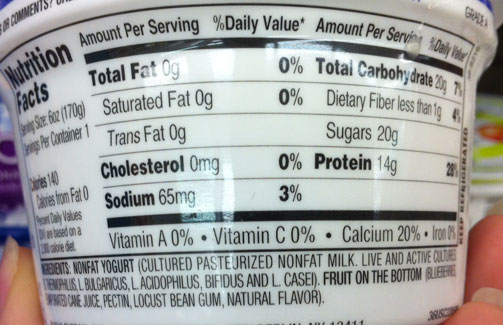Yogurt is considered a superfood, no matter which type. We have plenty to choose from regular yogurt, Kefir, liquid yogurt, and yogurt drinks such as Ayran and Greek yogurt. The creamy goodness of Greek yogurt makes it a great snack in its plain form but you can quickly turn it into a yummy treat by mixing it with fruits, nuts, seeds, or honey.
There’s just one “tiny” problem: not all Greek yogurt brands are the same, and you may end up eating an unhealthy product of what was supposed to be one of the healthiest foods. Here’s what you need to know:

There are no FDA regulations for Greek yogurt
The FDA has rules in place for what can or can’t be called “yogurt”, but none for the “Greek yogurt” variety. This allows producers to change the ingredients and how it’s made while still being able to sell their product under the name of Greek yogurt. Milk and live active cultures that’s all Greek yogurt labels should list as ingredients.
Sadly, lots of producers may skip the active cultures and add other ingredients such as whey protein and corn starch. Steer clear!
Greek Yogurt is supposed to be protein-rich
Usually, this type of yogurt should have about twice as much protein as regular yogurt. But there’s no rule as to how much protein Greek yogurt should pack. Producers use different straining processes which affect the protein content of the resulting product. Protein content in different Greek yogurt brands can vary even as high as 50%.

Not all Greek yogurt products are the same
Mainly because there are no FDA rules, concerning the definition of Greek Yogurt, not all of these products are the same. Greek yogurt is made by straining regular yogurt and removing the whey (milk serum), which gives the thick, cream consistency and protein-rich content that makes it so appreciated. Nevertheless, some producers skip the straining process and use thickening agents like corn starch, guar gum, and carrageenan to make the yogurt more solid and extra protein like whey concentrate or milk protein.
None of these ingredients will kill you, but it’s not Greek yogurt either. It’s very easy to avoid them, as none of them should be listed on the label.
Greek yogurt is not necessarily vegetarian
The traditional recipe, which only involves milk and live cultures to make Greek yogurt, is indeed suitable for lacto-vegetarians (the kind who don’t eat meat but do include dairy products in their diet). However, some Greek yogurt brands also contain gelatin for a firm consistency. Gelatin derives from collagen, which is made from animal by-products.

Frozen Greek yogurt is different than regular Greek yogurt
Frozen Greek yogurt is more of a dessert than a healthy snack. It’s not just plain Greek yogurt; the only similarity is the total number of calories. Frozen Greek yogurt has more sugar at the cost of less protein when compared to regular Greek yogurt. It’s really not the unhealthiest desert, but you should choose the plain variety if you just want healthy, nutritious food.
Flavored Greek yogurt is not that healthy
If you enjoy flavored Greek yogurt, you should know it also has added sugar, sometimes lots of it. As much as 15-25 grams of extra sugar can be included in just one serving of flavored Greek yogurt. IF you really want to turn Greek yogurt into a desert mix it with your favorite fruits, and nuts, and you could even add a bit of honey if you want to make it sweet.
